De Estische dichter, schrijver en vertaler Tõnu Õnnepalu werd geboren op 13 september 1962 in Tallin. Zie ook mijn blog van 13 september 2010 en eveneens alle tags voor Tõnu Õnnepalu op dit blog.
Uit: Flanders Diary (Vertaald door Miriam McIlfatrick)
“This perfect world is strange, and a little awful. I went out on the bike yesterday, planning to stay out longer, to go further, I felt that I could not stand being here in this room or outside any longer. Curious, at home I hardly ever get that feeling. I can move between room and garden for a whole week, going no further and it never enters my head that I should. If I have to go somewhere, it is simply a bore. It would be nteresting to know how many of those writers whose pictures are hanging on the corridor wall have agonized here? Most of them, I suspect. This bed where I toss and turn must have been a similar nightly battleground for a fair few. A struggle with your chimera, a writhing consciousness which wants to become itself in the mirror, but does not dare. Dreams. I am already a little afraid of this room with its cold, damp smell, the constant whine of a gnat in some corner, the broad white bed. Only at midday when the sun shines in through the withered vine tendrils and scatters patches of light over everything, is it good to stretch out, not on the bed but on the hard wooden sofa.
A perfect world … It would be if we did not have such imperfect dreams. Yesterday I decided to do the 39-kilometre cycle route and it was good. It goes along backroads, in between fields. There is more land round there, less real estate development. There is not much development anywhere, the real estate is for the most part ready, completed earlier. The same goes for the roads. The smaller roads here are made of reinforced concrete, they seem to consist of slabs with little interstices, just like the Narva, or rather, the Leningrad road once was. It was built by German prisoners of war. In one place near Tollenbeek I saw this concreting, they were doing repair work. Apart from that there is no major road construction anywhere to be seen. Everything is ready. When this was all done, all this concrete laid down between the cornfields and grazing land, is impossible to guess. Earlier. And all these houses. If anything else is built on, it is garages. Not that there aren’t any garages, where would you find a house without a garage! You can always add another one, two or three, if the site is big enough of course. Cars seem to be multiplying here, as with us. Life is good. Could it be better? I do not think so, not significantly. Everyone could have slightly larger houses, but would anyone want that, especially when they are away from home all day. There is enough to do as it is.The roads could be a little smoother, but what difference would it really make whether the road under you is very smooth or slightly less smooth if, on the way to work in the morning and back home in the evening, you have to sit in a traffic jam anyway?”
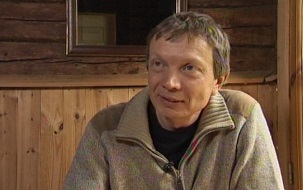
Tõnu Õnnepalu (Tallin, 13 september 1962)
De Britse schrijver Roald Dahl werd geboren op 13 september 1916 in Llandalf, Zuid-Wales. Zie ook mijn blog van 13 september 2010 en eveneens alle tags voor Roald Dahl op dit blog.
Uit: Going Solo
“When flying a military aeroplane, you sit on your parachute, which adds another six inches to your height. When I got into the open cockpit of a Tiger Moth for the first time and sat down on my parachute, my entire head stuck up in the open air. The engine was running and I was getting a rush of wind full in the face from the slipstream. `You are too tall,’ the instructor whose name was Flying Officer Parkinson said. ‘Are you sure you want to do this?’ `Yes please,’ I said. `Wait till we rev her up for take-off,’ Parkinson said. ‘You’ll have a job to breathe. And keep those goggles down or you’ll be blinded by watering eyes.’ Parkinson was right. On the first flight I was almost asphyxiated by the slipstream and survived only by ducking down into the cockpit for deep breaths every few seconds. After that, I tied a thin cotton scarf around my nose and mouth and this made breathing possible. I see from my Log Book, which I still have, that I went solo after 7 hours 40 minutes, which was about average. An RAF pilot’s Log Book, by the way, is, or certainly was in those days, quite a formidable affair. It was an almost square (8″ x 9″) book, 1″ thick and bound between two very hard covers faced with blue canvas. You never lost your Log Book. It contained a record of every flight you had ever made as well as the plane you were flying, the purpose and destination of the trip and the time you had spent in the air. After I had gone solo, I was allowed to go up alone for much of the time and it was wonderful. How many young men, I kept asking myself, were lucky enough to be allowed to go whizzing and soaring through the sky above a country as beautiful as Kenya? Even the aeroplane and the petrol were free!”
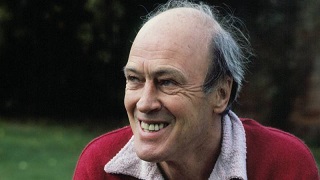
Roald Dahl (13 september 1916 – 23 november 1990)
De Poolse schrijver Janusz Glowacki werd geboren op 13 september 1938 in Poznań. Zie ook mijn blog van 13 september 2010 en eveneens alle tags voor Janusz Glowacki op dit blog.
Uit: The Last Supper (Vertaald door Zuza Glowacka)
“Several thousand people died in the catastrophes. Among them were two supermodels, whose deaths – directly preceding the autumn shows – were mourned by millions of ordinary people around the world.
In the meantime, the street lamps on Broadway lit up, followed by the lights in Lincoln Center, and Chagall’s winged creatures once again whirled in the air.
I thought about the passing of glory, but only for a second. Because a man who sat down at the table to my right began, pretty insolently, to bore into me with his puffy blue eyes. He looked about thirty. His legs were short, his torso long, his neck red, his nose was snub, his hair ashy and brushed up in a wave, his cheeks also red and slightly sagging. At first glance he looked familiar, but something about him didn’t fit. His enormous red paws stuck out from the sleeves of his elegant jacket, and a diamond ring which shone just like the real thing was shoved on one short, hairy finger. A second later, a black-haired waiter wearing an earring hustled around me, and with one, smooth movement, unfolded a little table, and placed a mini bucket with a linen napkin and packed with ice and an oversized bottle of Chopin Vodka on it. My neighbor leaned right behind it and over the table.
– Judging by your face, I’d say you were a fellow Slav – he hazarded.
I nodded and he moaned with relief and dropped into the chair next to me.
– My name is Kuba, – he said. And he squeezed my hand much too hard. We sat in silence for a while, and then he jabbed the cover of the magazine with his finger.
– Have you heard of Caine’s lottery by any chance?
The question was absurd. For the last few months, every television station had been occupied with this lottery and nothing else. The whole world knew about it.”
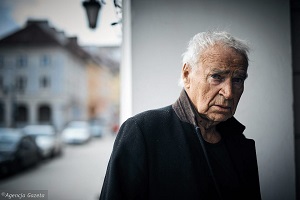
Janusz Glowacki (Poznań, 13 september 1938)
De Nederlandse dichter, schrijver en schilder Jacobus (Jac) van Looy werd geboren in Haarlem op 13 september 1855. Zie ook alle tags voor Jac. van Looy op dit blog.
Zacht valt de regen
Zacht valt de regen uit een hemel zonder pracht…
Die zich stil heeft betrokken met ’n water-zware vracht
Bij het komen van de nacht.
Geen ziet hoe het daalt uit dat duistre wolk-gespan,
Als de tranen stil geschreid van een hoge sterke man,
Die men voelen wel maar zien niet kan.
Langzaam zakt de stad in het duistren van de nacht.
Langzaam valt de regen uit de duistere hemel, zacht
Als een woordenloze klacht.
Op het kerkhof
Zij liggen rij aan rij de grijze zerken,
Omwonden met een band van dorrend lover;
Gevangen in des winters doffe tover
Slapen de wilgen en de bleke berken.
En op de koude wind is het als stoof er
Hij mij voorbij met zijn getakte vlerken,
En zoekend waart hij om die droeve merken,
Tellend hun tal, de strenge Levens-rover.
De dode blaren stuiven om de zoden,
Waar bloemen groeiden eens en donzen klaver,
Geboren op een graf en daar gestorven.-
Een spade dragend, het gelaat doorkorven
Van rimpels, stapt een stille dodengraver,
Teken van leven, door de hof der doden.
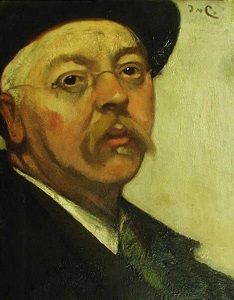
Jac. van Looy (13 september 1855 – 24 februari 1930)
Zelfportret 1922
De Nederlandse dichter, predikant en hoogleraarr Nicolaas Beets werd geboren op 13 september 1814 in Haarlem. Zie ook mijn blog van 13 september 2010 en eveneens alle tags voor Nicolaas Beets op dit blog.
Een stem van de overzijde
Als ’t leven over-leven wordt,
Al is het kort,
’t Schijnt lang te duren;
Hoe pijlsnel vroeger tijd verdween,
De laatste zijn de slependste uren;
Zij kruipen heen.
Maar troost de Heer, die ik aanschouw,
U in uw rouw,
Steunt Hij uw voeten,
Zo zult ge uw weg gemoedigd gaan,
Totdat wij ons bij Hem ontmoeten, –
Treed rustig aan!
Jong blijven
Het hart blijft jong en wordt niet oud,
Wanneer ’t zich fris en open houdt
Om al wat menslijk is te voelen,
Te voelen wat een kind verblijdt,
En wat er door de geest moet woelen
Eens jonglings, in zijn schoonste tijd.
Die zijn verleden in zich draagt,
Blijft jong, al is hij welbedaagd,
En wekt der jonkheid geen mistrouwen.
Veel kan hij hopen, wie veel heugt;
Veel met zachtmoedig oog beschouwen;
’t Herinn’ren is een grote deugd.
Verjaardag
De wereld aan te zien, welvarend nog en krachtig,
Maar met een afscheidnemend oog,
De zeventig voorbij, in ’t opgaan naar de tachtig,
Een leefkring die, uit veel, een enkle slechts voltoog;
Omstuwd van een geslacht, mij over ’t hoofd gewassen,
Meest door een andre geest dan mij vervult bestierd;
Op stelsels prat, die slecht bij wat ik voorsta passen;
Dat weinig missen zal als ’t ook mijne uitvaart viert:
Ziedaar wat ernstig maakt; maar niet gebiedt te treuren,
Zolang mij huwlijksmin en kinderliefde omringt,
Een Godlijk avondrood mijn westerkim blijft kleuren,
Zo menig lieve bloem mijn dalend pad doet geuren,
En tussen ’t gelend groen nog éne vogel zingt.
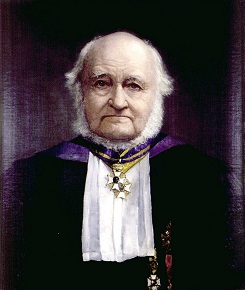
Nicolaas Beets (13 september 1814 – 13 maart 1903)
Portret door Johan Coenraad Ulrich Legner, 1903
De Oostenrijkse dichteres en schrijfster Marie Freifrau von Ebner-Eschenbach werd geboren op slot Zdislavice bij Kroměří¸ in Moravië op 13 september 1830. Zie ook alle tags voor Marie von Ebner-Eschenbach op dit blog
Uit:Krambambuli
„Vorliebe empfindet der Mensch für allerlei Dinge und Wesen. Liebe, die echte, unvergängliche, die lernt er – wenn überhaupt – nur einmal kennen. So wenigstens meint der Herr Revierjäger Hopp. Wie viele Hunde hat er schon gehabt, und auch gern gehabt; aber lieb, was man sagt lieb und unvergeßlich, ist ihm nur einer gewesen – der Krambambuli. Er hatte ihn im Wirtshause zum Löwen in Wischau von einem vazierenden Forstgehilfen gekauft oder eigentlich eingetauscht. Gleich beim ersten Anblick des Hundes war er von der Zuneigung ergriffen worden, die dauern sollte bis zu seinem letzten Atemzuge. Dem Herrn des schönen Tieres, der am Tische vor einem geleerten Branntweingläschen saß und über den Wirt schimpfte, weil dieser kein zweites umsonst hergeben wollte, sah der Lump aus den Augen. Ein kleiner Kerl, noch jung und doch so fahl wie ein abgestorbener Baum, mit gelbem Haar und spärlichem gelbem Barte. Der Jägerrock, vermutlich ein Überrest aus der vergangenen Herrlichkeit des letzten Dienstes, trug die Spuren einer im nassen Straßengraben zugebrachten Nacht. Obwohl sich Hopp ungern in schlechte Gesellschaft begab, nahm er trotzdem Platz neben dem Burschen und begann sogleich ein Gespräch mit ihm. Da bekam er es denn bald heraus, daß der Nichtsnutz den Stutzen und die Jagdtasche dem Wirt bereits als Pfänder ausgeliefert hatte und daß er jetzt auch den Hund als solches hergeben möchte; der Wirt jedoch, der schmutzige Leuteschinder, wollte von einem Pfand, das gefüttert werden muß, nichts hören.
Herr Hopp sagte vorerst kein Wort von dem Wohlgefallen, das er an dem Hunde gefunden hatte, ließ aber eine Flasche von dem guten Danziger Kirschbranntwein bringen, den der Löwenwirt damals führte, und schenkte dem Vazierenden fleißig ein. – Nun, in einer Stunde war alles in Ordnung. Der Jäger gab zwölf Flaschen von demselben Getränke, bei dem der Handel geschlossen worden – der Vagabund gab den Hund. Zu seiner Ehre muß man gestehen: nicht leicht. Die Hände zitterten ihm so sehr, als er dem Tiere die Leine um den Hals legte, daß es schien, er werde mit dieser Manipulation nimmermehr zurechtkommen.“
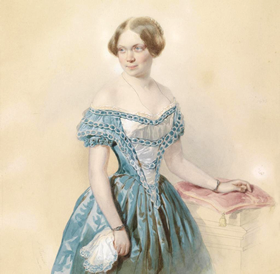
Marie von Ebner-Eschenbach (13 september 1830 – 12 maart 1916)
Als jonge vrouw rond 1850 op een aquarel van Johann Nepomuk
De Tsjechische dichter Otokar Březina werd geboren op 13 september 1868 in Počátky, Bohemen. Zie ook alle tags voor Otokar Březina op dit blog.
Reiner Morgen
Als wir des Morgens, der Träume Last noch fühlend, Gärten nahten,
Da sahen wir die ganze Welt, der frohen Seele Spiegelbild, aufblüh’n in Feuerstaaten,
Da fragten wir die Winde, Wässer, Vögel, Bienen, Bäume:
Wer heute Nacht, geheimnisvoll, durchschritt des Gartens Räume.
Zu Gold verwandelt spielt der Sand, wo heilige Spuren lagen,
Heilquellen rauschten, wellenreich, von Engelshauch getragen,
Ein jeder Hauch barg Lebenskraft für hundert Glutentage,
In jedem Blick lag Staunen und des Neugeborenen Frage.
Unserer Rätsel Schmerzenslast begriffen wir als deinen Ratschluß,
Versiegelt noch empfing dein Brief der Demut treuen Lehenskuß;
Und unsern Feind, der lauernd, bei unserem Tor schlief ein,
Als deinen Knecht, der matt sich lief, luden wir freundlich ein.
In fahrnisreicher Einsamkeit, umweht von böser Geister Macht,
Blüht uns’rer Wünsche zarter Hain, in lilienweißer Beete Pracht,
Und glutenreichste, süßeste, berückendste der Frau’n
Waren für uns, im keuschen Glanz, wie Schwestern mild zu schau’n.
Vertaald door Emil Saudek
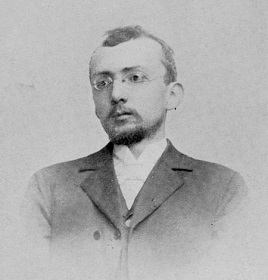
Otokar Březina (13 september 1868 – 25 maart 1929)
De Poolse dichter Julian Tuwim werd geboren in Łódź op 13 september 1894. Zie ook mijn blog van 13 september 2010 en eveneens alle tags voor Julian Tuwim op dit blog.
Archangel
Oh, what a charming guy!
Cultured and religious,
absolutely apolitical,
and so non-party it’s prodigious.
What lofty ideals
he whispers on the side!
What a clean and holy flame,
beats forth from his noble eyes!
Oh, what a beautiful platform he has,
both righteous and forthright:
absolutely apolitical
and delightfully non-party alright!
It must be so: Civilization,
Democracy, Freedom of Expression,
Victorious Spirit, Representative Government,
Likewise No Class-Based Oppression.
The heart grows when I listen
to his melodious tirades,
absolutely apolitical,
and delightfully non-party by the way.
There must also be Fairness,
Pure Art and Eternal Peace,
Love, Bliss, Luck—or, in a word,
a wonderful fairy-tale world at least.
Such a platform does give rise to fascination!
A true biblical paradise:
absolutely apolitical,
a miraculously non-party place.
“But Prophet, I say, my dearest deity!
while it sure sounds so brilliant and beautiful,
how does one make it real,
does one implement it, make it doable?
All will march behind your voice,
each accepting you as saviour—
Absolutely! Apolitically!
With enthusiasm! All Parties, I’m sure!
But tell me, my little prophet,
my archangel, my seer,
who will engineer these tiny details:
luck, harmony, freedom, mir?”
The prophet lost himself in deepest thought,
before elegiacially exhaling,
(absolutely apolitically
and non-party without failing)—
Then immediately in pure specifics
he told about his plan:
beginning with Sanctissimus,
and ending on Guderian.
And that is how from the Archangel
sprung the old reactionary swine:
absolutely apolitical,
and non-politically benign.
Vertaald door Pacze Moj
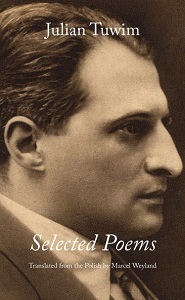
Julian Tuwim (13 september 1894 – 27 december 1953)
De Nederlandse dichter, schrijver en taalkundige Muus Jacobse werd op 13 september 1909 als Klaas Hanzen Heeroma geboren op het waddeneiland Terschelling. Zie ook alle tags voor Muus Jacobse op dit blog en ook mijn blog van 13 september 2010
En in die nacht vingen zij niets
Toen zij, als hongerenden naar de spijze,
Wachtten op de opstanding van de Heer,
Trokken zij naar het Galilese meer,
Dat Hij hun weer als vroeger zou verrijzen.
En Petrus zei: ‘Laat ons de zeilen hijsen!’
En ’s nachts staken zij af. Maar keer op keer
Zonk tevergeefs hun net in ’t donker neer,
Totdat het lege morgenlicht ging grijzen.
Toen verscheen Jezus voor hen op de oever
En heeft de plaats gewezen waar zij vingen,
En plots sleepte het net zwaar door het diep.
En Petrus hief het hoofd, staande te loever,
Alsof een haan de dag kwam openzingen,
En hij herkende weer dat Hij hem riep.
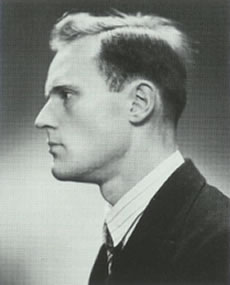
Muus Jacobse (13 september 1909 – 21 november 1972)
Zie voor nog meer schrijvers van de 13e september ook mijn blog van 13 september 2015 deel 2 en eveens deel 1.
